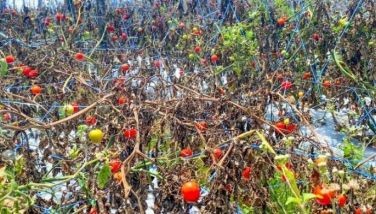Netizens urged: “Think before you click”
CEBU, Philippines - In this age of social media, members of the "traditional" media reminded the public, particularly the millennials, to be more responsible on every click they make.
Howie Severino, vice president and anchor of GMA Network, said current trends are shaping the future of journalism wherein one has the power to create an impact to the society.
"With social media, one can produce news... even accidentally. You have the power to communicate directly to one person... or to many," he says.
Severino talked about the changing media landscape from mainstream to online, citing as an example the two papal visits to the Philippines.
"During the visit of Pope John Paul II in 1995, everybody was waving. But during the visit of Pope Francis last year, everybody was shooting. That's the difference," he says, showing photos of the huge crowd of the faithful gathered around the popemobile of the two church leaders.
Severino also recalled the days of using the pager and experiencing boo-boos after relaying messages to the operator.
Severino, along with Rappler editor-at-large Marites Vitug and former Philippine Daily Inquirer journalist Nancy Carvajal, spoke before fellow practitioners in yesterday's 5th Metrobank Foundation Media Training Series on digital journalism in partnership with Probe Media Foundation, Inc.
While he admitted that news content may come from anyone whether he is a journalist or not, Severino lamented the dissemination of "wrong, false, and harmful information" online.
"This is the age of information. We are also in the age of misinformation. With new power comes new responsibility but that power has flipside. Social media has the power to do many things but it also has the power to spread hate," he stated.
Severino further enumerated the online dangers including hate, threats of death and violence because of political disagreement, online recruitment by terrorists, and casual, anonymous sex.
He then shared rules observed by GMA News Online team in dealing with the social media. The network is known for its "Think Before You Click" campaign.
Severino reminded the netizens to verify facts for posting or retweeting and to always keep in mind that anything they upload can be shared by others.
"Verification is the heart of journalism," he said.
"Don't do and say anything in social media that you would not do in public. Acknowledge, delete, and/or correct errors and apologize if necessary. And the best lesson of all, don't do anything stupid," Severino advised.
Even with the accessibility of digital devices and advent of social media, Severino said more than half of the population in the country is still not connected to the Internet.
"We (media) have to make sure the rest of the population is not left behind," Severino told journalists.
Severino, who was also once a print journalist before he became a TV personality, said traditional media practitioners have to pursue interesting stories in order to stay relevant and guide the audience to keep an eye on what is important.
"Nothing can replace the old-fashioned methods of data gathering. Journalists are among the vanguard of any generation," he said.
Severino even commented on the harsh comments of some netizens calling media outfits biased, saying "Kung kami (media) hindi ninyo na puwedeng pagkatiwalaan, sino na ang puwede ninyong pagkatiwalaan?"
For Carvajal, the public is overwhelmed by information with the new media environment, which leads them to be confused with fact from opinion and cannot anymore distinguish news from propaganda.
She reminded the netizens to make sure the information they get and believe to come from legitimate media organizations, adding that most easily rely on unverified online posts or sites.
"It's very important to check the source of the story if it is legitimate. That's the only way to discern it — the source," she said.
Carvajal stressed the importance of getting the information straight from professional journalists to be assured of factual stories.
"Iba yung may training ka, may accountability ka. You cannot just fabricate stories. It has to be truthful. I think that's the big difference sa mga post na hindi totoo. Unfounded yung kanila. Sa atin, it's done by persons trained to do the news," she said.
With the digital age, Carvajal said it is now the duty of journalists to put these information gathered into context.
"I don't consider Facebook as journalism. For me, journalism is a discipline," Carvajal opined.
Carvajal said that there should be fair, accurate and capable of high-impact investigative journalism in both traditional and online media.
"In journalism, regardless of the platform, the object is the same — to inform. Technology is good as long as it works," she said.
Meanwhile, Vitug said those from the traditional media can still interest today's audience through many forms of storytelling such as timelines and fast facts. She, however, stressed that while there are new ways of delivering information, old rules such as accuracy and fairness still apply.
"There are no shortcuts. Always, always get all the sides of the story. Every minute is a deadline," Vitug said. (FREEMAN)
- Latest



























